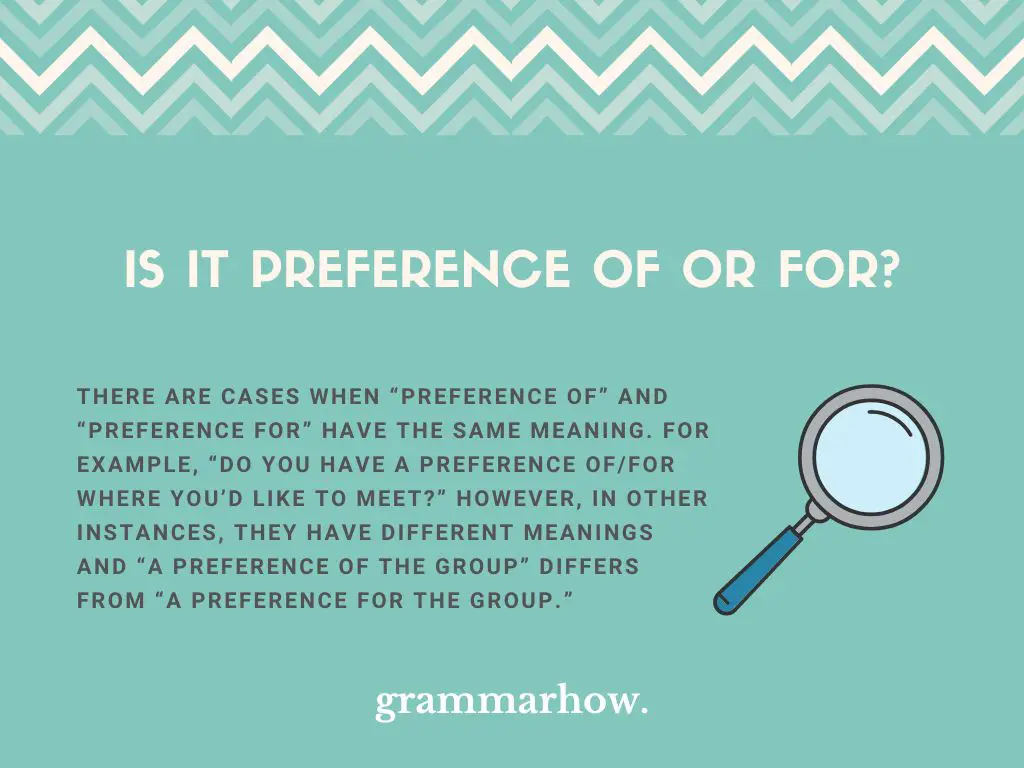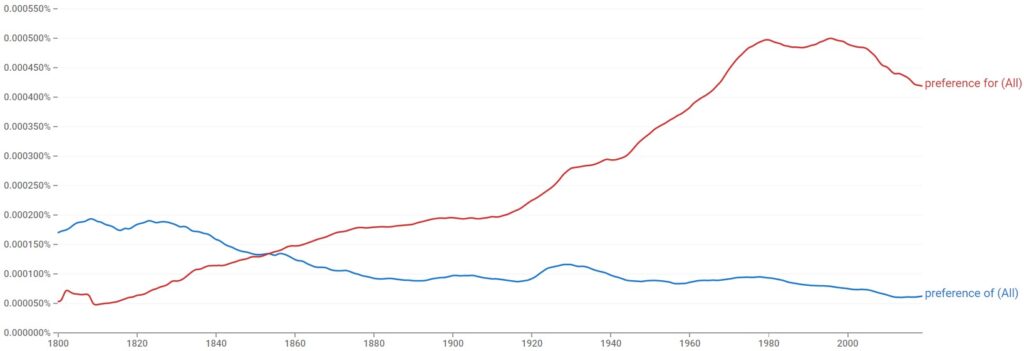The terms “preference of” and “preference for” are the same except for a change in a preposition. This article looks at the differences and similarities between the terms and shows examples that demonstrate how to use the words in a sentence.
Is It Preference Of or For?
There are cases when “preference of” and “preference for” have the same meaning. For example, “do you have a preference of/for where you’d like to meet?” However, in other instances, they have different meanings and “a preference of the group” differs from “a preference for the group.”

When asking or instructing about somebody’s preference for something, there is no difference between “preference of” and “preference for.” However, when discussing the preferences of a group, the word “of” means the preference belongs to the group, whilst “for” indicates a preference “towards” the group.
In these examples, when we are asking someone to give their “preference”, there is no real difference in meaning
- Please tell me your preference of/for a time to meet on Friday.
- What is her preference of/for food at the wedding?
- Let me know your preference of/for a venue for the party.
In these sentences, which are not questions and we are not directing anyone to give their opinion, the meaning is slightly different and “of” is not appropriate:
- She has a preference for pizza rather than pasta.
- I have always had a preference for fast cars.
- Some dogs show a greater preference for biting humans than others.
In these sentences, it is not possible to use “for” when you are saying “who” the preference belongs to:
- The preference of my mother is that we don’t go out.
- The preference of the team is that we change captains.
- The “preferences of” one group should not overrule what everyone else thinks.
If we change these sentences to include “for,” then the meaning changes drastically
- The preference for my mother meant that my father felt left out.
- The referee’s preference for the team made the game unbiased.
- The teacher’s preference for one group shouldn’t mean that everyone is excluded.
Preference Of
The term “preference of” can refer to two different things. The first is when you are asking someone to provide their “preference” regarding something like a place or a time, you can say “, tell me your preference of location.” In this context, the “of” can also be replaced by “for.”
The second use is to describe the “preferences of” a particular group of people. In this context, the word “of” cannot be replaced by “for.”
Here are some examples to show “preference of” in a sentence:
- Call me to tell me your preference of/for a day to meet next week.
- You should let me know your preference of/for a restaurant for your birthday.
- The preference of the group is that you resign.
- It is the preference of my husband and I that you don’t come over here anymore.
Preference For
The term “ preference for” indicates which something you prefer, or it can also indicate that a person simply likes something. In some contexts, such as when asking someone their “preference for a time or place” to meet, it is the same as “preference of.”
Here are some examples of “preference for” in a sentence:
- Tell me your preference for/of a place to meet this Saturday.
- Let me know if you have any preference for/of a time to get tother and go over the sales figures.
- I have always had a preference for white meat.
- She has a preference for expensive clothes and food.
Which Is Used the Most?
The Google Ngram Viewer shows that from 1800 to 1860, “preference of” was more common; however, since 1860, “preference for” has been the more frequent of the terms worldwide.

There is also no significant variation between American and British English usage, with both countries almost mirroring the global trend.
Final Thoughts
In some circumstances, like when you ask someone their preferences, “preference of” and “preference for” are synonyms. However, when describing people’s preferences, “preference for” describes “what” they like, while “preference of” describes “who” likes it.
